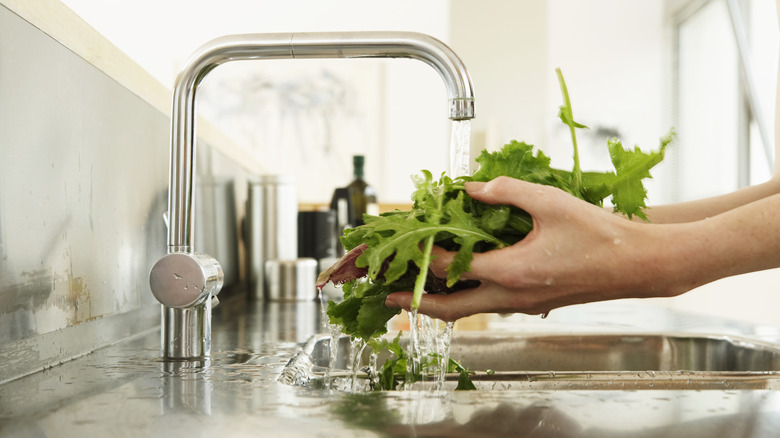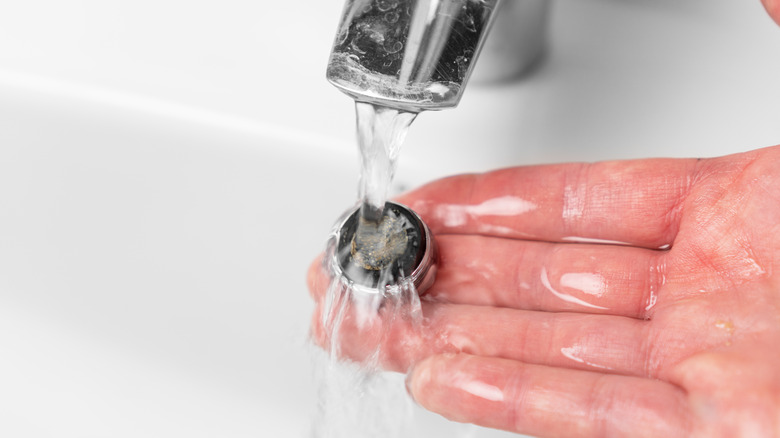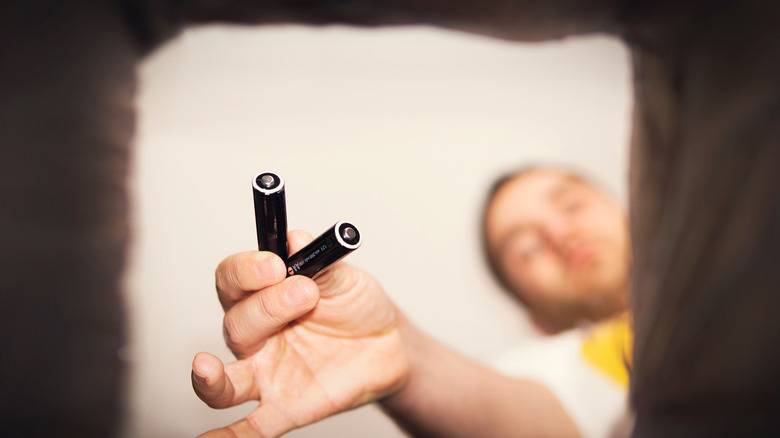Common Maintenance Issues That Shorten The Life Of Touchless Kitchen Faucets
Kitchen sinks and faucets are an important part of every cooking space — albeit not the most exciting fixture. Well, not until the last few years at least. What was once a humble kitchen workhorse is now available in models that are smarter and more tech-savvy than expected. Some faucets now offer voice and temperature control, as well as a touchless operation — a win for anyone who knows the pain of being covered in cookie dough or raw meat and trying to finagle the handle with your elbow. Although they're useful, as with any fixture or appliance, things can go wrong if it's not maintained properly. There are a few common maintenance issues that can happen with touchless faucets, including not cleaning the aerator and not replacing the batteries and sensors when needed.
If your kitchen is now outfitted with one of these sleek and modern hands-free faucets, you're probably reveling in the improvement it has made in your cooking and cleaning processes. But don't let the excitement cloud your mind — to hold onto that efficiency it provides and make the most of it, you'll want to keep these specific parts clean and ensure the power source isn't faltering. If you already have this style of sink installed or are looking at investing in a touchless faucet, knowing the best maintenance practices will help extend its life. Here are the maintenance issues many people run into and the potential issues they cause.
You haven't cleaned the aerator or solenoid valve
Touchless faucets are a great way to conserve water in your home and boost efficiency, while still providing powerful water pressure. But, if you're not cleaning specific parts of your faucet, you can run into common problems that affect the flow. One important piece is the aerator, which is the disc responsible for releasing air bubbles into your water flow and providing the "oomph" in high-pressure streams. It also plays a part in keeping unwanted materials and particles from mingling in your drinking water. A common maintenance issue is not cleaning the aerator. It should be deep cleaned every six months at a minimum. Forgetting to do so can lead to dribbly water pressure.
This isn't the only component in your touchless faucet that needs regular cleaning. The solenoid valve and its membrane can also get blocked up without proper maintenance. This piece plays a large part in controlling the flow of water and actions when the flow needs to be stopped and started. Like the aerator, it should be cleaned to avoid early replacement and a poor water stream (or no water coming out at all).
You haven't replaced the batteries or sensor on your touchless faucet
Another common maintenance issue with touchless kitchen faucets comes down to ignoring the battery life and sensors. These are the parts that enable your sink's hands-free capabilities, so it's important you don't forget to keep your sensor clean and replace its power source and sensors when necessary. Batteries should be replaced every two to five years. If you don't swap out low batteries in time, you'll be met with a blinking light or blank interface and no water stream when you wave your hand across the surface. Waiting too long to replace it means the battery is likely now fully dead. A low battery voltage not only prevents the sensor from working, but it can be responsible for slow water flow, too.
Speaking of sensors, this is another part that should be kept clean. Try to clean up any gunk or food that gets smeared across its surface when it happens and be mindful of how hard you press on the sensor when cleaning. Caring for your sensor will extend its life, too. Without the right care or replacement when necessary, you might hear a clicking sound, but no water comes out — that's usually a sign that it needs to be replaced. While it may seem like a lot of maintenance for your sink, it's imperative to keep everything running smoothly after you've spent time choosing the perfect kitchen faucet and money investing in it.


